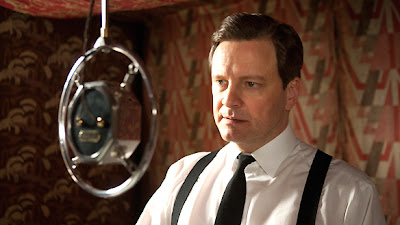The Fighter
Directed by David O. Russell
Screenplay by Scott Silver, Paul Tamasy, Eric Johnson
Cast
"Irish" Micky Ward - Mark Wahlberg
Dick "Dicky" Eklund - Christian Bale
Charlene Fleming - Amy Adams
Alice Ward - Melissa Leo
The Fighter is about a working-class boxer, Micky Ward, who is supposed to be an against-all-odds hero, yet yields his heroic role to his brother Dicky. Dicky's the one who opens and closes the film; he provides the main source of conflict; and he even takes over the climax. As Christian Bale, who plays the scene-stealing brother, pointed out in his Golden Globe acceptance speech, Micky is the stoic protagonist, who rarely undergoes emotional turmoil (although Bale dedicated his win to this quiet character Wahlberg plays). Except one scene where Micky expresses his resentment towards his mother Alice, most of the time he's stuck in the middle of the tug-of-war between the Alice-Dicky duo and his girlfriend Charlene.
While the film delivers emotional jabs in several tense scenes, these scenes mainly revolve around the three supporting characters. For instance, when Charlene and Dicky work out a deal hurling foul words at each other, all Micky does is to arrive near the end of the fight, get out of his car, and hold his girlfriend in his arms. Outside the ring, he doesn't really have angry outbursts, get his face distorted in agony or his voice choked with frustration. Even if he does show determination to win the world championship during his confrontation with Alice
Maybe I complain too much. Some would argue as long as a film evokes pathos, it doesn't matter where that pathos comes from. So Micky's lack of heroic qualities may not be as important as the emotional pull that, say, Dicky and Charlene's final cathartic fight or the very last match Micky fights exerts. From the beginning to the moment of victory, you might find yourself muttering, "Head, body, head, body." The final scene matching the opening one, and the story turns in between, are all predictable, but you can't help but feel gratified when the underdog roars in triumph. In addition, the intense feelings the film conveys are effectively balanced out by the lighthearted scenes dominated by Micky's father (Jack McGee) and boxing montages.
All in all, The Fighter is a film that grows on you the more you see it. The Alice-Dicky duo are the types of character you just can't hate, despite their shortcomings. Charlene is the one you sympathize with the most. Micky can be boring, yet you are still going to care about him. Yes, Dicky's more like a comeback hero than Micky is, but this biopic is without a doubt an engaging drama and you probably won't care which character tugs at your heartstrings.
***1/2

